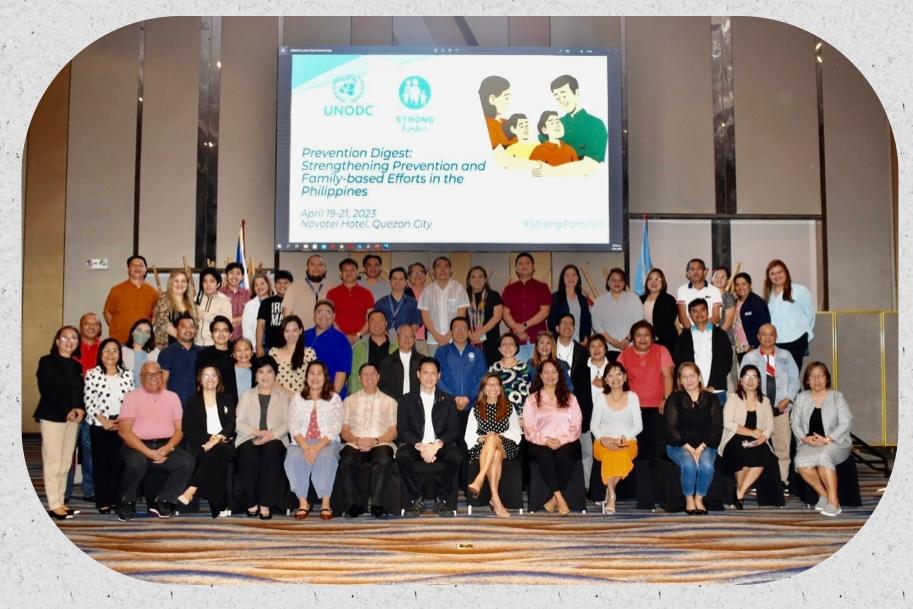
Attendees of the United Nations Office on Drugs and Crime Conference pose for a photo at Novotel Manila, Quezon City recently, with the theme “Prevention Digest: Strengthening the prevention strategy and family-based initiatives in the Philippines”.
Rex Education presented their “Bawat Paaralan Edukampyon (BPE) Continuum” for bolstering drug-abuse prevention at the recent United Nations Office on Drugs and Crime (UNODC) Conference at Novotel Manila, Quezon City.
The UNODC Conference brought together organizations, decision-makers, and those who administer preventative programs for discussions on how to deal with the nation’s drug-related issues. UNODC urged people and organizations to contribute drug-abuse prevention strategies that are health-centered and focused on family intervention under the topic “Prevention Digest: Strengthening the prevention strategy and family-based initiatives in the Philippines”. The healthcare system, evidence-based initiatives, and Philippine family-centered intervention experiences were all on the table.
During the 3rd day of the event, REX was among the government and non-government organizations who shared their experiences with prevention programming, as well as the impact and influence of these initiatives.
Taking a whole school approach to reform initiatives
BPE officially launched during the January 2021 Annual Educators’ Congress, where 400 private and public schools expressed interest and intent in pilot implementing the framework.
In March 2021, pilot implementation for BPE began with 13 schools completing one implementation cycle. These schools were Marantha Christian Academy, St. Edward School, Canossa Academy Calamba, Ednas School, Cherished Moments School, Colegio de Santa Rita de San Carlos, Inc., Cabulay High School, San Andres Elementary School, Divisoria High School, Rosario National High School, Sagana National High School, Patul National High School, and Sinili Integrated School.
REX gave life to the portmanteau ‘Edukampyon’, a combination of the words edukasyon (education) and kampyon (champion) to mean champions of education. The BPE program is grounded in the Edukampyon advocacy: To engage duty-bearers and build their capacities for respecting, protecting, and fulfilling the right to quality education.
Pursuant to BEDP 2030, REX advocates a whole school approach that entails the collaboration of all members in a school community. The whole school approach recognizes that the informal curriculum is just as valuable as the formal one, highlighting the importance of providing learners with inclusive and safe environments beyond the classroom. This framework is meant to advance agendas on global education and reform initiatives such as health awareness, eradication of violence, and drug-abuse prevention.
The whole school approach also comes into play in promoting the six facets of the Filipino whole learner. REX has identified various indicators that should ensure a Filipino learner is healthy, safe, engaged, supported, challenged, and values-oriented. Across these indicators, there is a common theme that encourages school culture and leadership to promote learners’ physical and mental health, implement policies relevant to civic participation, and equip students with the essential competencies for lifelong learning. Families and communities are recognized as a major part of this advocacy, as the success of a child’s education largely relies on the effective collaboration of stakeholders advocating every learner’s well-being.
Bawat Paaralan Edukampyon in support of UNODC standards
Based on the standards of UNODC, drug-abuse prevention is a significant motivator for children, young adults, and adults to contribute positively in their families, schools, workplace, and communities. Drug-abuse prevention at the school level focuses on the health and safety of children and youth, in a bid to encourage self-actualization that can lead to the realization of their full potential, prompting them to become productive members of society.
UNODC has found that developing a student’s personal and social skills can prevent drug use and alcohol abuse. For children aged 10 and below, programs centered on improving resistance skills and self-control have been shown to reduce general problem behaviors in and out of the classroom. Several other factors can also influence discouragement of substance abuse, such as students’ academic performance, commitment to school, and social opportunities.
To achieve these benchmarks, REX designed BPE as a three-tier implementation framework that will allow schools to conduct systematic assessments of their progress in the UNODC’s domains. BPE encourages schools to work with their stakeholders, students, parents, and community members in the planning and implementation of activities and interventions that are relevant to UNODC’s standards.
Bawat Paaralan Edukampyon as an exemplary school-community-family program for drug-abuse prevention
The BPE’s pilot implementation allowed learners to learn about drug-abuse prevention through the collaborative efforts of their teachers, administrators, parents, and other stakeholders. In particular, parents reported feeling more engaged and knowledgeable of their children’s school activities and priorities after participating in the BPE process.
The participating schools demonstrated high levels of involvement and support, demonstrating their understanding of the BPE framework. REX wants to use this assistance to improve BPE advocacy, communications, and educational programs for additional schools across the country.
By doing this, REX was able to supplement UNODC’s guidelines for preventing drug use. The three pillars that supported the success of BPE’s first launch—valuing partnerships, highlighting the significance of successful parenting, and disseminating evidence-based preventative strategies—proved to be key. In an effort to make children and youth more resistant to drug use and to make a larger impact on BPE, REX is devoted to doing so.

No Comments